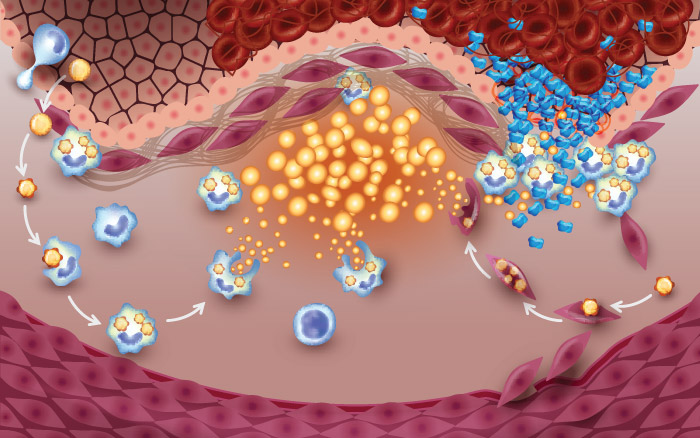- Home
- About Us
- Advanced Testing
- Nutrition & Self-Care
- Further Learning
- New Member Info
- Contact
Myeloperoxidase is a vascular specific enzyme that is a marker and mediator of inflammation and oxidative stress. It can be an indicator of plaque forming or breaking. This test can help determine if you are at risk of a plaque rupture (that can cause a sudden heart attack or stroke).
White blood cells release MPO when an arterial wall is inflamed or damaged (from the luminal side of the plaque), so elevated levels may indicate the presence of unstable plaque (which can suddenly rupture and cause a heart attack or stroke). In addition, MPO oxidatively modifies LDL cholesterol, as well as causing HDL to be less functional . . . which both precipitate atherogenesis by leading to an excess of cholesterol rich plaque in the arterial wall. 2

“Multiple lines of evidence suggest an association between MPO and cardiovascular disease including coronary artery disease, congestive heart failure, arterial hypertension, pulmonary arterial hypertension, peripheral arterial disease, myocardial ischemia/reperfusion-related injury, stroke, cardiac arrhythmia and venous thrombosis.” 4 “In addition, plasma and serum levels of MPO have been shown to predict risks of subsequent major adverse cardiac events (nonfatal myocardial infarction, death, and need for revascularization) in patients presenting with either chest pain or acute coronary syndromes.” 3
Overall, elevated MPO levels are associated with a poor prognosis. 4 Thus in patients with high levels of MPO, careful evaluation of cardiovascular risk should be considered by the healthcare professional so appropriate interventions can be implemented to lower MPO and subsequent CV risk.
Do something today for a better tomorrow!
Make an appointment now for advanced testing. We are here to help.
REFERENCES
1 – Brennan ML, Penn MS, Van Lente F, et al. Prognostic value of myeloperoxidase in patients with chest pain. N Engl J Med. 2003;349(17):1595-1604.
2 – https://www.ncbi.nlm.nih.gov/pubmed/19556446
3 - https://www.ahajournals.org/doi/full/10.1161/01.atv.0000163262.83456.6d
4 - https://www.sciencedirect.com/science/article/pii/S0009898119300841